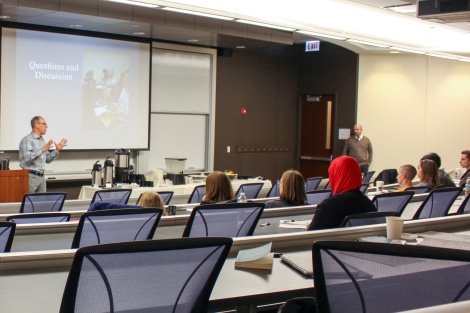On October 21, Dr. Stuart Selber presented “Teaching and Learning in a Digital Age: Agents, Infrastructures, Pedagogies” to WRD students and faculty. In attendance at the event were students from both the WRD Proseminar and the NMS Proseminar, who have been reading Selber’s monograph Multiliteracies for a Digital Age.
In his talk, Selber explored the ways current technologies set the social scene for teaching writing, rhetoric, and discourse to students at colleges and universities. Selber began by discussing commonly accepted characteristics of today’s students and the technologies and infrastructures that inform their reading and writing practices. He emphasized that procedural knowledge, associative thought patterns, and technological savvy characterize these ‘digital natives’ in many current essays and think-pieces. Although Selber cautioned against thinking about this demographic as a monolithic category, he offered a heuristic for educational approaches that aim to “situate the procedural knowledge of today’s students in broader rhetorical contexts.”
Selber suggested that teachers of writing, rhetoric, and discourse should think of pedagogy and technology as symbiotic. In doing so, teachers could define technology in social terms, analyze literacy claims in the formal features of technology, and approach curricular integration with technology as a dialectical process. Selber drew from his personal experiences as a professor of English and Science, Technology, and Society at Penn State to illustrate this heuristic for action, and discussed the ways that he has adapted institutional technologies for his own pedagogical aims.
Selber has produced much-acclaimed work as a researcher, writer, and teacher throughout his career. He has received prestigious awards from the Conference on College Composition and Communication, the National Council of Teachers of English, and Computers and Composition. In addition to delivering frequent academic lectures and workshops, he also applies his technical communication expertise as a consultant for organizations such as The DuPont Company and the United States Department of Agriculture.
